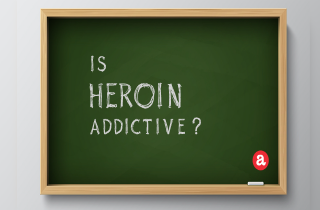YES. Heroin is addictive.
But what makes heroin addictive? How long does heroin stay in your body? And how do you know when the addictive properties of heroin have taken over? We’ll review these questions here. We even invite your questions about the addictive liability of heroin at the end.
What is heroin used for?
Heroin is an opiate drug that has no legitimate medical uses. In the U.S., it is illegal to own or use heroin. However, heroin is still used to cause a euphoric high in people who abuse this dangerous street drug.
What is heroin made of?
Heroin is a natural substance. It’s derived from morphine, which occurs naturally in the opium poppy. Heroin can be sold as a powder or a solid substance, which may be sticky or hard.
How addictive is heroin?
Heroin is extremely addictive. Its chemical similarity to morphine and other opiate medications means it has a similar abuse liability. Heroin’s strong effects on the central nervous system cause it to be frequently abused, even though it’s only possible to obtain it as an illegal street drug. Although heroin overdoses occur as tolerance builds, snorting heroin or mixing alcohol with heroin and other central nervous system depressants often end up in overdose.
How do you get addicted to heroin?
It’s easy to get addicted to heroin. If you’re abusing heroin regularly to get high, you’re very likely to become addicted. Or if you use heroin in very high doses, that also makes it easier to get addicted to heroin. Either way, if you make the conscious choice to abuse this dangerous drug, you may become addicted to heroin.
Signs of heroin addiction
Heroin addiction involves a psychological craving for the drug. You may be addicted to heroin if you need to take heroin to deal with normal stresses in daily life, or feel you can’t function without it. Other signs of heroin addiction include:
1. Continued heroin abuse despite negative life consequences
2. Craving heroin and using it compulsively
3. Seeking heroin in order to stimulate the “reward center” of the brain
Heroin addiction potential questions
Do you still have questions about heroin addiction potential? Please leave them here. We are happy to help answer your questions personally and promptly. If we do not know the answer to your particular question, we will refer you to someone who does.









Related Posts